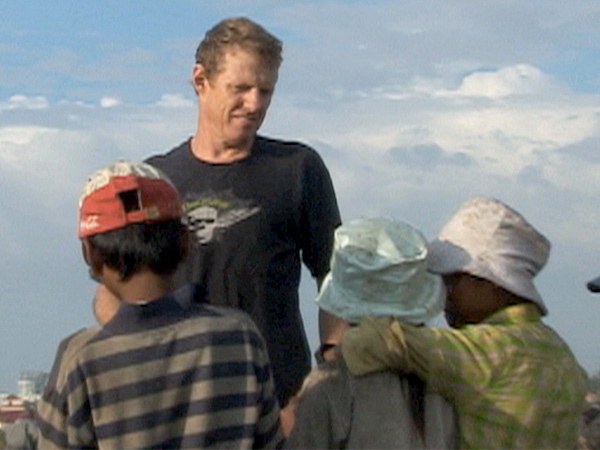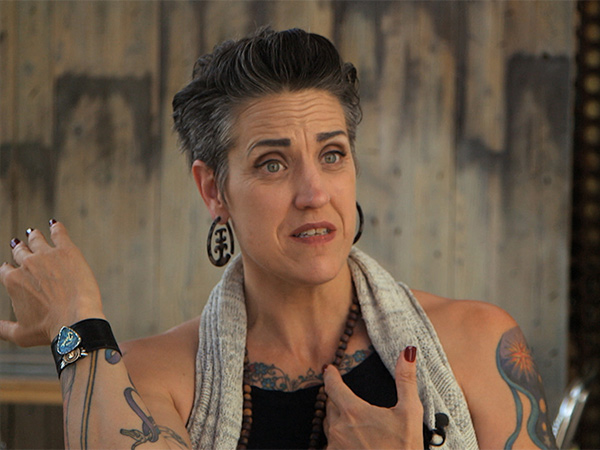
LUCKY SEVERSON, correspondent: I’ve been in the news business a long time. First in local, then national, then international. For almost 20 years I’ve been doing stories for this program, and I’ve had far more fun than I deserve and met some amazing people along the way who have made the world a better place—people like Scott Neeson, the former president of 20th Century Fox International.
Scott Neeson found most of his kids at this mountain of garbage outside Cambodia’s capital city of Phnom Penh. Pictures alone don’t do it justice—don’t reveal the stench, the filth, maggots, the chemical waste and sharp, jagged objects.
SCOTT NEESON: When I first came here I had nightmares. I had terrible dreams for a week or two afterwards, and I think some of the things I’ve seen out here are just horrendous.
SEVERSON: He had come here backpacking, one of Hollywood’s major movers and shakers.
You were a man of means?
NEESON: I was a man of means and luxuries. And yet — I sort of enjoyed it, but I wasn’t particularly happy.
 SEVERSON: So he started a live-in school where kids attend classes by day and learn about their culture by night. He started with 40 kids. Then more each year.
SEVERSON: So he started a live-in school where kids attend classes by day and learn about their culture by night. He started with 40 kids. Then more each year.
NEESON: There’s no going back. I mean, what would happen here with 117, 118 children who are going through the process of changing their lives? They’re trying their best. I mean, how do you just walk away from that? Do you put them back in the streets? Do you just try and forget about it?
SEVERSON: Today he’s schooling 2500 kids, operates the only free clinic in Cambodia, supports 200 students in university, and is building an academy atop the dump where he saved so many lives. In the beginning we asked if he was the “real deal.” Seems that he is. But there are some seemingly good people who are actually too good to be true.
 SEVERSON: There are big churches, and then there’s the Yoido Full Gospel Church here in Seoul, South Korea. It’s the mother of megachurches, with the largest congregation in the world.
SEVERSON: There are big churches, and then there’s the Yoido Full Gospel Church here in Seoul, South Korea. It’s the mother of megachurches, with the largest congregation in the world.
It’s a prosperity gospel church headed by one of the most revered religious leaders in Korea, the Reverend David Yonggi Cho.
REVEREND DAVID YONGGI CHO: People don’t come to our church because I’m holy person, I’m spectacular Christian. No. They come because I supply their need. I meet their need through the word of God.
SEVERSON: Sadly, not too long after I interviewed Pastor Cho he was sentenced to three years in prison for embezzling $12 million. That money could have gone a long way with Father Michael Doyle of the Sacred Heart Church in one of America’s poorest cities, Camden, New Jersey.
 FATHER MICHAEL DOYLE (Sacred Heart Church): Dontae Perkins, 25, shot to death...
FATHER MICHAEL DOYLE (Sacred Heart Church): Dontae Perkins, 25, shot to death...
SEVERSON: It’s a Mass for the 55 young men and women murdered in Camden in the past year, Father Michael Doyle officiating.
In 2012, there were 266 shootings, 67 homicides, which makes Camden per capita, according to the FBI, the most dangerous city in the U.S.
SEVERSON: But Father Doyle sees something else.
FATHER DOYLE: I see it all the time, a beauty that’s deep and wonderful and sometimes tragic, but beauty absolutely, I do. Their faces are there with their burdens and their wrinkles and their difficulties and so forth, but beauty that’s just jumping at you.
SEVERSON: He’s not a fire and brimstone preacher, but he gets things done, quietly. He’s raised money to start an inner city primary school. His church also funds a food kitchen, and has refurbished over 250 decaying homes and resold them at affordable prices.
 SEVERSON: I guess if Camden can turn it around, any place can turn it around?
SEVERSON: I guess if Camden can turn it around, any place can turn it around?
FATHER DOYLE: That’s very, very true. If we had Frank Sinatra come here and sing for us “If you can do it there...”
SEVERSON: ...you can do it anywhere.
FATHER DOYLE: That’s right. You can do it anywhere.
SEVERSON: If Father Doyle shows what a humble man can accomplish, The House for all Sinners and Saints in Denver shows what a preacher with tattoos and sharp edges can do for people who might not be welcome in other churches.
REV. NADIA BOLZ-WEBER: My name is Nadia Bolz-Weber. I am a pastor in the Evangelical Lutheran Church in America. Maybe you’ve heard of that?
 So much of spirituality is about sort of sanding ourselves down, you know, smoothing ourselves out so that we’re nice and shiny. But the fact is, is that I think the jagged edges of our humanity are what actually connect us to God and to one another.
So much of spirituality is about sort of sanding ourselves down, you know, smoothing ourselves out so that we’re nice and shiny. But the fact is, is that I think the jagged edges of our humanity are what actually connect us to God and to one another.
SEVERSON: Take Stuart Sanks. He was one of the earliest members, a drag queen known here as the Minister of Fabulousness.
About a third of the pastor’s congregation of 350 are in the LGBTQ community, but a growing number of new members are straight. She herself was raised in a conservative, fundamentalist church.
REV. BOLZ-WEBER: I mean this church was really about saying you know you’re Christian if you avoid doing these naughty things. So there’s the naughty list. If you’re good at not doing these things, that means you’re a good Christian.
That’s the thing that is so puzzling to me about conservative Christianity in America, is that what I read from Jesus, are things like that -- the first shall be last, the last shall be first. Look at who he hung out with.
SEVERSON: Churches are normally all about saving souls, but there’s a bishop in Africa who is on a crusade to save trees, and don’t tell him there’s no global warming.
The greeting is especially rambunctious because we’re traveling with the African version of Johnny Appleseed. Some call him the “Tree Bishop.” His name is Frederick Shoo, and he is the Assistant Bishop of the northern diocese of the Evangelical Lutheran Church of Tanzania. He oversees 500,000 members and 164 parishes. The Bishop is on a crusade to plant trees to save the glaciers on Mount Kilimanjaro.
 BISHOP FREDERICK SHOO: It does not need a PhD to see that already people are experiencing the impact of global warming. A simple farmer in the village can tell that something is wrong with our climate.
BISHOP FREDERICK SHOO: It does not need a PhD to see that already people are experiencing the impact of global warming. A simple farmer in the village can tell that something is wrong with our climate.
SEVERSON: In the last 100 years, 92 percent of the glaciers atop Mount Kilimanjaro have disappeared. Some estimates predict they will be all gone by the year 2020. And without the ice and snow, the rivers that flow down the mountain that nourish millions of Tanzanians will simply dry up.
SEVERSON: If they don’t have the water and you don’t have the rain…
BISHOP SHOO: You’re absolutely right. Then there is no life here.
SEVERSON: So everyone, not just church members, has a quota to plant so many trees each year. The bishop won’t marry anyone who doesn’t plant a tree at the wedding.
SEVERSON: Finally, a young street preacher in Oakland, California who was in his fourth year of his doctorate at UC Berkeley when he stumbled onto Luke chapter 6, which says, “Give to all that ask.” So he did, and they called him crazy.
VINCENT PANNIZZO (praying): Heavenly Father, we pray for the Holy Spirit to enter our hearts...
SEVERSON: They know he understands their situation because the preacher- man, Vincent Pannizzo, is one of them.

PANNIZZO (praying): In the name of the Lord, Jesus Christ, we pray. Amen.
I despair every single day, every day, yeah. I mean, how would you like to be homeless, living on the street? You'll say, "Well, you chose homelessness." I don't choose anything. God chooses everything for us.
SEVERSON: First he invited the homeless into his apartment, until his wife left him. Then he lived with the homeless. He got day jobs as a carpenter, and whatever he earned, he gave to the homeless.
LOUISE HILL: He keeps nothing for himself at all. He buys food for people, and he keeps nothing for himself.
PANNIZZO (on the street): Want some bread? I’ve got some rolls…
It's painful. I don't like people to think that I'm nuts. I like to be treated with respect and dignity. I mean, for crying out loud, I once desired a career in academia. And now here I am a homeless guy, having nothing, being a servant to everybody on the street and people thinking that I'm nuts or on drugs.
SEVERSON: I did that story about ten years ago, and I have been trying ever since to find Vincent. Here was a man who did what the Bible tells us to do and people called him nuts. If you know of Vincent’s whereabouts, please let me know.
BOB ABERNETHY, host: You can email Lucky with information about Vincent Pannizzo at religionethicslucky@gmail.com.


 SEVERSON: So he started a live-in school where kids attend classes by day and learn about their culture by night. He started with 40 kids. Then more each year.
SEVERSON: So he started a live-in school where kids attend classes by day and learn about their culture by night. He started with 40 kids. Then more each year. SEVERSON: There are big churches, and then there’s the
SEVERSON: There are big churches, and then there’s the  FATHER MICHAEL DOYLE (Sacred Heart Church): Dontae Perkins, 25, shot to death...
FATHER MICHAEL DOYLE (Sacred Heart Church): Dontae Perkins, 25, shot to death... SEVERSON: I guess if Camden can turn it around, any place can turn it around?
SEVERSON: I guess if Camden can turn it around, any place can turn it around? So much of spirituality is about sort of sanding ourselves down, you know, smoothing ourselves out so that we’re nice and shiny. But the fact is, is that I think the jagged edges of our humanity are what actually connect us to God and to one another.
So much of spirituality is about sort of sanding ourselves down, you know, smoothing ourselves out so that we’re nice and shiny. But the fact is, is that I think the jagged edges of our humanity are what actually connect us to God and to one another. BISHOP FREDERICK SHOO: It does not need a PhD to see that already people are experiencing the impact of global warming. A simple farmer in the village can tell that something is wrong with our climate.
BISHOP FREDERICK SHOO: It does not need a PhD to see that already people are experiencing the impact of global warming. A simple farmer in the village can tell that something is wrong with our climate.





